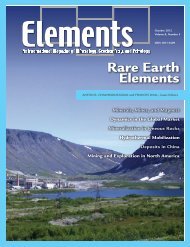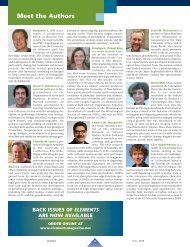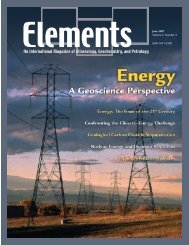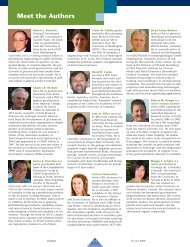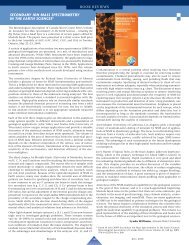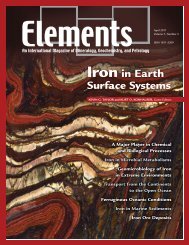Front Matter (PDF) - Elements
Front Matter (PDF) - Elements
Front Matter (PDF) - Elements
You also want an ePaper? Increase the reach of your titles
YUMPU automatically turns print PDFs into web optimized ePapers that Google loves.
DO WE NEED MORE APPLICATIONS<br />
OF GEOCHEMISTRY<br />
TRIPLE POINT<br />
Last year, Rod Ewing wrote a Triple Point column<br />
on the theme “Is Geochemistry Important,” in<br />
which he made a compelling case for the importance<br />
of mineralogy and geochemistry in the<br />
modern world. For my first foray as a Triple Point<br />
editor, I would like to take his topic in a different<br />
direction and question how effective we are at<br />
recognising the practical use of geochemistry (and<br />
of course mineralogy).<br />
Bruce Yardley<br />
All scientists hope that their work will prove of<br />
lasting value to humanity in some way or other, although there is some<br />
doubt as to whether this wish is always fulfilled. The Earth sciences<br />
deal with some of the most challenging aspects of the world we live<br />
in, and there is an enormous amount of popular curiosity about the<br />
topics we investigate, from the origins of the planet to the human<br />
impact on it. However, as well as being interesting to the public, Earth<br />
scientists are useful: resource geology, for example, has underpinned<br />
every civilisation that has left a record, and doubtless<br />
many that have not. So where does geochemistry/<br />
mineralogy belong in the pantheon of useful sciences<br />
We have little doubt that what we do is important<br />
and valuable, but is that reflected in industry’s<br />
demand for graduates<br />
I fear that all too often geochemistry research is not<br />
seen as of great economic or social value, and our<br />
good students are much more likely to continue in<br />
research than be offered jobs in industry. The world<br />
of applied geochemistry is quite small relative to academic<br />
geochemistry, and the interface has become<br />
less porous with time. Is this a situation that we<br />
should try to change, or does it just reflect the way<br />
of the world I began to appreciate the scale of the differences between<br />
geochemistry and some other areas of the Earth sciences when I served<br />
on the Council of the Geological Society of London. I was taken aback<br />
to discover that the GSL has about 9000 members, of whom academics<br />
make up a tiny proportion and industry scientists the vast majority.<br />
By contrast, the Geochemical Society has around 3000 members worldwide,<br />
most from academia and government. So not only are there a lot<br />
more geologists and geophysicists than geochemists, but a far higher<br />
proportion of geology and geophysics graduates become industrial<br />
practitioners than go into research. Does this mean that what we do<br />
has less value to the outside world than we suppose Does a little geochemistry<br />
go a long way Or is the world just slow to respond to modern<br />
advances in geochemistry<br />
Perhaps the answer to all three of these questions is “yes”. Some years<br />
ago I attended a small mineral deposits meeting with several excellent<br />
presentations on the origins of gold deposits. I asked a senior geologist<br />
from Rio Tinto how important this research would be for his company.<br />
The response was that, although gold deposits are the subject of a high<br />
proportion of ore deposits research, they made only a small contribution<br />
to the company profits. Most of the profits came from mining iron<br />
ore, which is the subject of rather little geochemical research. Before<br />
we all get too excited about the potential of iron ore research, remember<br />
that if a deposit can be evaluated by geophysics and the ore-rich zones<br />
identified remotely, then understanding why it is there, however intellectually<br />
satisfying, is unlikely to have a commercial impact until the<br />
resource is almost exhausted. As far as inorganic geochemistry is concerned,<br />
the view from the hydrocarbon industry is not so very different.<br />
There are some fields in this industry with problems which require an<br />
understanding of geochemistry, but it is not such a big issue that even<br />
But our community must<br />
also recognise and<br />
respect the importance<br />
of applications of<br />
geochemistry.<br />
major oil companies have to employ a lot of inorganic geochemists. So<br />
a small amount of geochemistry can result in sufficient understanding<br />
to allow many industries to go their own way for quite a while.<br />
Geologists and geophysicists are needed on the ground all the time,<br />
not just during exploration but also to inform production strategies.<br />
On the other hand, most geochemists (those involved in geochemical<br />
mapping are an obvious exception) provide general concepts to develop<br />
exploration or production approaches, but at a level where ideas can<br />
be transferred without the need for the work to be repeated everywhere.<br />
The main area where geochemistry is being used in a practical, dayto-day<br />
manner is in the environment. Detailed geochemical input is<br />
needed to deal with waste and groundwater issues, and each site has<br />
to be investigated separately. That means that geochemists have to be<br />
involved on a site-by-site basis. In many countries, it is difficult for<br />
researchers to get funded for academic research that is designed to<br />
repeat at a new location what has been done elsewhere, but applied<br />
science is exactly about applying basic research to specific new areas<br />
where it will be useful. Geochemistry will not mature<br />
as a major scientific discipline until a bunch of geochemists<br />
is doing exactly that.<br />
Should we conclude that too much geochemistry is<br />
too academic to be of practical use in the foreseeable<br />
future Well, a lot of it certainly is, but I believe that<br />
there are industries that could benefit from geochemistry<br />
if they were more engaged with it. For example,<br />
a recent <strong>Elements</strong> issue concerned carbon dioxide<br />
sequestration. Here is a field which, despite the<br />
obvious chemical implications of injecting carbon<br />
dioxide into wet rocks, has proceeded happily at the<br />
level of engineering trials with relatively little geochemical<br />
input. Reservoir engineers develop plans for<br />
injection with geochemical input at the chemical engineering level,<br />
but without a fundamental understanding of longer-term reactivity in<br />
the reservoir, despite the enormous impact that such reactions might<br />
have on storage capability and the risk of leakage. Such work is going<br />
on, but is seldom closely tied to what companies are doing today.<br />
Likewise, many examples of the application of geochemical and isotopic<br />
techniques to unravel environmental problems have been published,<br />
but this has not trickled down to routine practice and regulatory<br />
requirements.<br />
If geochemistry is going to be used for the good of society, we must<br />
communicate what we do beyond our immediate academic circles, but<br />
we also need to understand the nature of the problems that industry<br />
deals with. Often their main concerns are with the quantities of materials<br />
present – the law of mass balance; on the other hand, many geochemists<br />
find it hard to see beyond the evaluation of approach to equilibrium<br />
– the law of mass action. Perhaps if we can engage better with<br />
real problems that industry faces, we may be able to show that geochemistry<br />
can make a difference. But our community must also recognise<br />
and respect the importance of applications of geochemistry. At<br />
present, our societies do not offer the level of professional support that<br />
practitioners need, and few societies whose names suggest that they<br />
embrace geochemistry or mineralogy as a whole give medals to people<br />
who work with practical applications. These are things we can do something<br />
about.<br />
Bruce Yardley<br />
University of Leeds<br />
ELEMENTS 5<br />
FEBRUARY 2010



